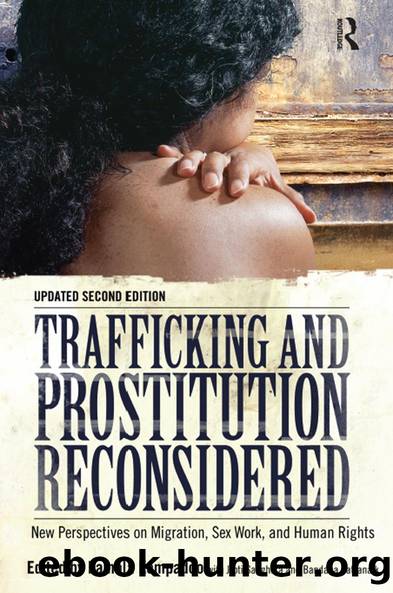Trafficking and Prostitution Reconsidered by unknow

Author:unknow
Language: eng
Format: epub
Tags: Social Science, Sociology, General
ISBN: 9781317264514
Google: yUYeCwAAQBAJ
Publisher: Routledge
Published: 2015-12-03T05:05:22+00:00
Definition of Trafficking in Persons for This Document
One of the most hotly disputed elements of the protocol was Article 3, which defines trafficking in persons. Ideologies resembling those of the NGO blocs were visible among the different government delegations, leading to protracted discussion of the definition of trafficking. Consensus was extremely difficult to achieve. Rather than list all the proposed definitions, I will use examples of the more contentious dialogue.
Debates about the definition of trafficking typically centered on whether to include all sex work, an issue on which the different camps were deeply divided. This was demonstrated not only by the expression of opposing views but also by the sacrifices that proponents were willing to make to ideology. The discussion of prostitution eclipsed the plight of trafficked personsâincluding menâin other industries. Additionally, examples of a willingness to sacrifice womenâs autonomy were evident during these discussions. For some feminists, sex work and the exchange of sex for goods or money, as in prostitution or possibly even dating, is a reinforcement of male social elevation over female. While most feminists and certainly most women do not take this much further than acknowledging that an exchange for sex exists and that they may not approve, a minority make this a core issue. This is reflected in some of the recommendations which were offered for the definition of trafficking.
The sacrifices that certain factions were willing to make in the name of ideology were illustrated by some of the emotionally charged pleas made on the floor of the UN in favor of certain proposed definitions. For example, a written suggestion from the Philippine delegation was circulated on June 6, 2000, which suggested a definition of trafficking that included the formula, âwith or without consent of the victim by legal or illegal means, for all purposes of sexual exploitation including prostitution, marriage, employmentâ¦â13 If adopted, such a definition would have criminalized as trafficking not merely prostitution, but also marriage and even employment. While this is clearly an extreme, not to say ludicrous example, it is one of the dangers of an obsessive and myopic focus on prostitution that it opens the door to the willing sacrifice of other essential liberties and rights in the name of eradicating prostitution.
In a UN protocol, definitions necessarily afford a certain interpretive leeway for enforcement by signatory nations, in order to allow consensus to be achieved in such a large meeting. The Trafficking Protocol does not prohibit additional measures and/or sterner enforcement, thereby allowing signatory nations to enforce additional domestic legislation regarding these crimes and to assess punishment for them as they see fit. Such an allowance for domestic legislation affords great variation in the possible enforcement of this document nation by nation. Thus nations are able to legislate prostitution as they see fit. Australia, Germany, the Netherlands, and New Zealand, among others, were very clear that they would not sign a protocol that would require them to change their national laws to outlaw prostitution. Their sentiments on this matter are in line with the Human Rights Caucus.
Download
This site does not store any files on its server. We only index and link to content provided by other sites. Please contact the content providers to delete copyright contents if any and email us, we'll remove relevant links or contents immediately.
Collaborating with Parents for Early School Success : The Achieving-Behaving-Caring Program by Stephanie H. McConaughy; Pam Kay; Julie A. Welkowitz; Kim Hewitt; Martha D. Fitzgerald(897)
Entrepreneurship Education and Training: The Issue of Effectiveness by Colette Henry Frances Hill Claire Leitch(665)
Adding Value to Policy Analysis and Advice by Claudia Scott; Karen Baehler(499)
Materializing the Middle Passage by Jane Webster;(496)
Race and American Political Development by unknow(488)
Sociological Perspectives of Health and Illness by Constantinos N. Phellas(478)
American Government and Politics Today by Steffen W. Schmidt Mack C. Shelley Barbara A. Bardes(475)
Human and Global Security : An Exploration of Terms by Peter Stoett(461)
Control Of Oil - Hardback by Kayal(459)
The Disappearance of Rituals: A Topology of the Present by Byung-Chul Han(399)
Advances in Child Development and Behavior, Volume 37 by Patricia J. Bauer(396)
The Catholic Church and European State Formation, AD 1000-1500 by Jørgen Møller(388)
The World According to China by Elizabeth C. Economy(379)
Theories of Counseling and Psychotherapy: A Case Approach by Nancy L. Murdock(370)
Left Is Not Woke by Susan Neiman(367)
Application of classical statistics, logratio transformation and multifractal approaches to delineate geochemical anomalies in the Zarshuran gold district, NW Iran by unknow(362)
Turkey's Relations with the West and the Turkic Republics: The Rise and Fall of the Turkish Model by Idris Bal(353)
Cross-Cultural Child Development for Social Workers by Lena Robinson(348)
Japan's Ainu Minority in Tokyo by Mark K. Watson(331)
